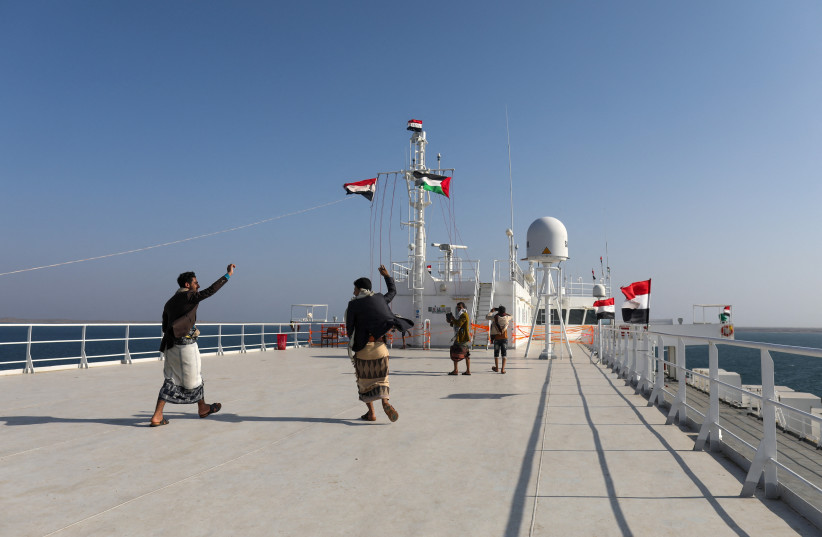Yemen's Iran-aligned Houthi movement said on Tuesday that they carried out a military operation against the Norwegian commercial tanker M/T Strinda.
The group targeted the tanker with a rocket after the crew refused to respond to all warnings, Houthi military spokesperson Yehia Sareea said in a televised statement.
He added that the group had managed to obstruct the passage of several ships in recent days, acting in support of the Palestinians.
Sareea vowed that the Houthis would continue blocking all ships heading to Israeli ports until Israel allows the entry of food and medical aid into the Gaza Strip—more than 1,000 miles from the Houthi seat of power in Sanaa.
The United Kingdom Maritime Trade Operations originally reported through Monday night that there had been an attack in the Bab el-Mandeb Strait. UKMTO is a public service operated by the Royal Navy to provide information for security services and merchant vessels.
They reported that there was a fire onboard the vessel and that all crew were safe. It is not clear if the ship is connected to Israel or was headed to an Israeli port.
US defense officials claimed that a land-based cruise missile fired from Houthi-controlled territory in Yemen was responsible for the damage, as well as confirming that a US Navy ship had arrived to render support.

The attack on the tanker Strinda took place about 60 nautical miles (111 km.) north of the Bab al-Mandab Strait connecting the Red Sea and the Gulf of Aden at about 2100 GMT (11 p.m. Israel time), a US official told Reuters. A second US official said the tanker was able to move under its own power in the hours after the attack.
"There were no US ships in the vicinity at the time of the attack, but the [Navy destroyer] USS Mason responded to the Strinda's mayday call and is currently rendering assistance," the US military's Central Command (CENTCOM), which oversees American forces in the Middle East, said in a statement posted on social media platform X (formerly Twitter).
The chemical tanker is Norway-flagged, and its Norwegian owner, Mowinckel Chemical Tankers, and manager Hansa Tankers could not be immediately reached for comment outside office hours.
These reports come as attacks on shipping in the Red Sea have ramped up, with attacks reported on a near-weekly basis and becoming increasingly frequent.
Both France and the United States have been involved in interceptions in the Red Sea recently. America increased its presence in the Red Sea after the Houthis fired missiles toward Israel last month.
After several successful interceptions of Houthi missiles, the Yemen-based terrorist group changed tack and began seizing ships that they claim are associated with Israel, which are often carrying Israeli products or are partly owned by an Israeli.
The Houthis announced on December 9 that all ships sailing to Israel are banned from the Red and Arabian Sea.
White House National Security Adviser Jon Finer directly accused Iran's Islamic Revolutionary Guard Corps of providing weaponry and intelligence to the Houthis.
Iran's Foreign Minister Hossein Amirabdollahian essentially confirmed Iran's involvement in the Red Sea attacks, saying that at any moment there could be a "big explosion in the region," while pointing to the various attacks on US bases and Red Sea shipping.
Explosions heard inland
Local sources report explosions heard inland near a Houthi camp in Al-Hawban in the Taiz Governate, as well as the sound of aircraft.
Israel was reported to have struck Houthi targets in Yemen on December 1, by the Saudi al-Hadath TV, however, senior Houthi officials denied this, saying it was caused by the detonation of old munitions.
Al-Hadath reported soon after the explosion was heard in Al-Hawban, that the joint forces were coordinating with Saudi Arabia to "protect and secure the sea corridor in the Red Sea."
They also reported that a Saudi military delegation had been met in Mokha by a member of the Presidential Leadership Council with the purpose of increasing Yemen's maritime security.
A spokesperson for the internationally recognized Yemeni government said that the Houthis were merely using the Israel-Hamas war as a pretext to spread more chaos at the expense of the people of Yemen.
Reuters contributed to this report.
